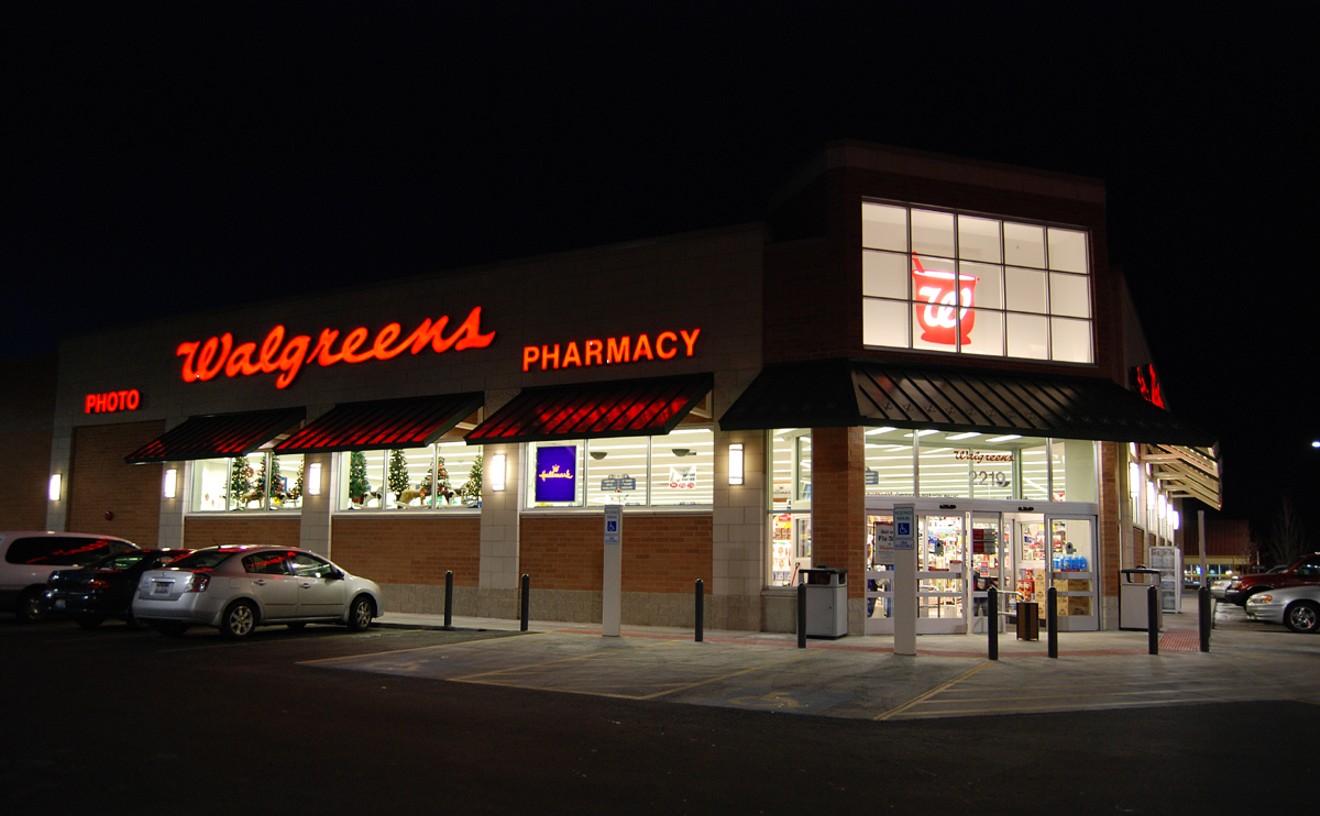Now, the better part of three years later, Jensen Farm operators Eric and Ryan Jensen have been sentenced to five years' probation and six-months home detention following the sort of prosecution one lawyer said was "as rare as hen's teeth." Photos, video, a timeline and more below.
As we reported last September, a document filed by U.S. Attorney John Walsh's office maintained that the Jensens "allegedly introduced adulterated cantaloupe into interstate commerce. Specifically, the cantaloupe bore a poisonous bacteria, Listeria monocytogenes. The Information further states that the cantaloupe was prepared, packed and held under conditions which rendered it injurious to health."
This last statement is key. The Centers for Disease Control long ago linked the fruit to Jensen Farms, via an impressive exhibition of scientific detective work sketched out in a detailed timeline seen in both text and graphic form. See both on the second page of this post.The results were undeniably tragic. Beyond the aforementioned 33 deaths and 147 hospitalizations, the U.S. Attorneys Office points out that a pregnant woman who ate some of the cantaloupe subsequently suffered a miscarriage and ten other people who had been infected also died, albeit not directly from Listeriosis. Moreover, the impact was sweeping: The six shipments of cantaloupe found to have been contaminated with Listeria monocytogenes were sent to 28 different states.
The trick for prosecutors was establishing that the contamination came as a result of criminal neglect. They argued that the farm's processing center, including a conveyor system for cleaning, cooling and packaging the cantaloupe, should have "worked in such a way that the cantaloupe would be washed with sufficient anti-bacterial solutions so that the fruit was cleaned of bacteria."
But in May 2011, the brothers allegedly switched to a new system that was built to clean potatoes. The device included a catch pan "to which a chlorine spray could be included to clean the fruit of bacteria," but prosecutors say it was never used. They also argue that "the defendants were aware that their cantaloupes could be contaminated with harmful bacteria if not sufficiently washed." This action, they believe, constituted criminal conduct and justified charges of introducing "adulterated cantaloupe into interstate commerce."
These assertions appear to have persuaded the Jensens to work with authorities, rather than drag the matter through even more years of litigation -- a point stressed by U.S. Attorney Walsh in a statement released after the sentencing."The prosecution recommended probation in this case because of the defendants' unique cooperation, including their willingness to meet with Congress and their willingness to meet with and be confronted by the victims of their misconduct," Walsh notes. "They have committed to continue their cooperation, and have publicly and privately expressed sincere remorse. In short, they have done everything we have asked of them to mitigate the damage done."
Of course, nothing can restore the losses suffered by the friends, family members and loved ones of the victims in the case, as Walsh acknowledges. Still, the Jensens are receiving punishment beyond mere public censure. In addition to the probation and home detention, they've also been ordered to perform 100 hours of community service apiece and pay restitution of $150,000 -- $25,000 for each of six counts against them, with the money going to victims.
Although that's a pittance, other outbreak-related litigation continues. Attorney Bill Marler's firm, Marler Clark, has resolved all complaints against the Jensens, who filed for bankruptcy in 2012. But a Marler Clark post points out that litigation on behalf of 45 victims -- 28 who died and seventeen sickened by consuming the tainted fruit -- continues against retailers such as Walmart and Kroger, King Soopers' parent company, in multiple states. Marler estimates medical expenses for those involved exceeds $12 million.
Continue for more about the listeria outbreak, including a video and a timeline. Here's a 9News report about the Jensen brothers' September 2013 court appearance, followed by text and PDF versions of the Centers for Disease Control's timeline of the listeria outbreak.
Centers for Disease Control chronology of the outbreak:
Outbreak Identification, Source Implication, and Results of Product TestingSeptember 2: The Colorado Department of Public Health and Environment (CDPHE) notifies the Centers for Disease Control and Prevention (CDC) of seven ill persons with listeriosis (Listeria infection) reported since 8/29/11.
September 5: Cantaloupes are collected by CDPHE for Listeria testing from the home of an ill person.
September 6: PulseNet defines outbreak strains in CO patients and identifies an ill person in NE and another in TX, each infected with an outbreak strain of Listeria. Initial interviews of 7 ill persons in CO with standard CDC questionnaire find all ate cantaloupe. Three ill persons report eating cantaloupe from one region in Southeastern CO ("Rocky Ford").
September 7: CDC begins coordinating the multistate investigation.
September 8: CDC asks states to use the supplemental questionnaire created by CDPHE to learn more about cantaloupe eaten by ill persons. Food and Drug Administration (FDA) begins investigation with initial information collected by CDPHE to identify sources of cantaloupe eaten by ill persons. Cantaloupes are collected by CDPHE for Listeria testing from retail locations where ill persons reported buying cantaloupes.
September 9: CDPHE announces that cantaloupes are the likely cause of illness and warns high-risk CO residents not to eat them. Cantaloupes are collected by FDA for Listeria testing from retail locations where ill persons reported buying cantaloupes.
September 10: FDA and CDPHE visit Jensen Farms for an inspection and to collect environmental and product samples. The broker for Jensen Farms stops distribution of cantaloupes and tells grocery stores to remove Jensen Farms cantaloupes from shelves.
September 11: Preliminary traceback investigation suggests that cantaloupe produced at Jensen Farms was sold at several retail locations where ill persons reported buying cantaloupe marketed as coming from one region in Southeastern CO.
September 12: CDC posts initial web announcement about the investigation, saying that the multistate outbreak of listeriosis is linked to cantaloupes marketed as coming from one region in Southeastern CO, and warning persons at high risk nationwide not to eat them.
September 13: FDA issues a statement that public health officials have discovered that most ill persons consumed cantaloupe purchased whole, most likely marketed as coming from one region in Southeastern CO.
September 14: CDC posts another web update about the investigation, including a warning that the multistate outbreak of listeriosis has been linked to cantaloupes from Jensen Farms. FDA announces that Jensen Farms has issued a voluntary recall of their whole cantaloupes.
September 15-October 31*: CDC and states continue to conduct surveillance for outbreak illnesses. A team of CDC epidemiologists deploys to Colorado to assist CDPHE in assessing exposures and outcomes among pregnant women. CDC publishes a final web update on December 8, which reports 146 cases, 30 deaths, and 1 miscarriage.
September 16: A sample of cantaloupe collected by CDPHE from 2 retail location stores supplied by Jensen Farms yields an outbreak strain of Listeria.
September 19: Cantaloupes and environmental samples collected at Jensen Farms by FDA yield an outbreak strain of Listeria.
September 22: FDA, along with CO state and local officials, begins an environmental assessment at Jensen Farms.
September 23: Carol's Cuts of Kansas City, Kansas initiates a recall of fresh cut cantaloupe and cut mixed fruit containing cantaloupe because the cantaloupe was produced by Jensen Farms.
October 6: Fruit Fresh Up of Buffalo, New York initiates a recall of individual packages of fresh cut cantaloupe and cut mixed fruit containing cantaloupe because the cantaloupe was produced by Jensen Farms.
October 18: FDA issues a warning letter to Jensen Farms based on the presence of the outbreak strains of Listeria in environmental and cantaloupe samples taken on 9/10.
October 19: FDA announces findings of its environmental assessment at Jensen Farms.
*Excludes a newborn diagnosed with listeriosis with a specimen date in November whose mother was reported as a case earlier in the outbreak.
Send your story tips to the author, Michael Roberts.
More from our Calhoun: Wake-Up Call archive circa May: "Rocky Ford cantaloupes making a comeback, but drought's drying up other crops."











